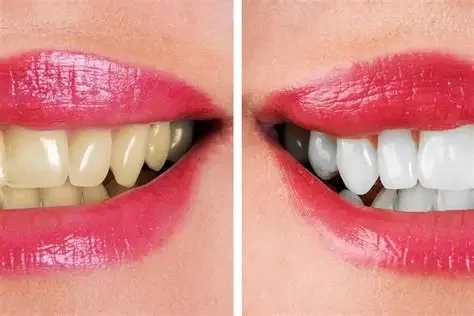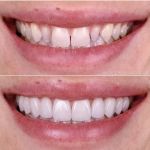
Best Foods to Avoid Tooth Staining for a Brighter Smile
- 1 - Understanding Tooth Staining and Its Causes
- 2 - Common Foods That Cause Tooth Staining
- 3 - How to Prevent Tooth Staining
- 4 - Dental Hygiene Tips for a Brighter Smile
- 5 - Foods That Help Keep Your Teeth White
1 - Understanding Tooth Staining and Its Causes
Tooth staining is a common concern for many individuals seeking a brighter, whiter smile. Whether caused by lifestyle choices, food and drink consumption, or natural aging, stained teeth can affect both self-esteem and overall dental health. Understanding the causes of tooth staining is key to preventing it, and making the right food choices plays a significant role in this process.
1.1 - Types of Tooth Stains
There are two main types of tooth stains: extrinsic and intrinsic. Extrinsic stains occur on the surface of the teeth and are primarily caused by food, drinks, and tobacco. Intrinsic stains, on the other hand, are deeper, affecting the inner structure of the teeth and are often a result of aging, trauma, or excessive fluoride use.
1.2 - How Food Contributes to Staining
Certain foods and beverages contain pigments that can easily stick to the enamel of your teeth, leading to stains. These stains can build up over time, resulting in discoloration that can be hard to remove. Some foods are more prone to causing stains than others, especially those with darker colors or high acidity.
2 - Common Foods That Cause Tooth Staining
While maintaining a balanced diet is essential for overall health, some foods and drinks are known for their potential to cause tooth staining. Let’s take a look at some of the main culprits that can dull your smile.
2.1 - Coffee and Tea
Both coffee and tea are notorious for their ability to stain teeth. They contain tannins, a type of polyphenol that causes color compounds to stick to your teeth. Regular consumption of coffee or tea can lead to yellowing or brown stains that are difficult to remove without professional cleaning.
2.2 - Red Wine
Red wine, like coffee and tea, is packed with tannins and deep pigments that contribute to staining. The acidity in red wine also wears down enamel, making it more susceptible to discoloration. If you’re a red wine lover, consider rinsing your mouth with water after drinking to reduce the staining effect.
2.3 - Berries and Dark Fruits
While fruits like blueberries, blackberries, and pomegranates are packed with antioxidants, they can also leave dark stains on your teeth. The deep, rich colors of these fruits make them high in anthocyanins, which can cause discoloration over time.
2.4 - Sauces and Condiments
Sauces like soy sauce, tomato sauce, and curry contain strong pigments that can easily stain teeth. These sauces also tend to be acidic, which can erode enamel and leave your teeth more vulnerable to stains from other foods. To reduce staining, try rinsing your mouth with water after consuming these types of condiments.
2.5 - Sugary Foods and Sodas
Sugary foods and sodas not only contribute to cavities but can also promote the formation of plaque, which can trap pigments from other foods and cause staining. Carbonated sodas, in particular, are highly acidic and can erode enamel over time, further encouraging staining.
3 - How to Prevent Tooth Staining
While it’s not always possible to completely avoid foods that stain, there are several steps you can take to minimize their impact on your smile. By following these preventive measures, you can enjoy your favorite foods without worrying too much about stains.
3.1 - Rinse Your Mouth After Eating
One of the best ways to prevent staining is by rinsing your mouth with water after consuming stain-causing foods. This helps to wash away any pigments that might have adhered to your teeth. Carrying a bottle of water with you can make this process easy, even when you’re on the go.
3.2 - Use a Straw for Beverages
When drinking beverages like coffee, tea, or soda, using a straw can help minimize contact with your teeth. This reduces the amount of staining that occurs because the liquid bypasses your teeth and goes directly into your mouth.
3.3 - Brush Regularly
Regular brushing is key to keeping your teeth clean and free from stains. Brushing twice a day with fluoride toothpaste helps remove plaque buildup and prevent discoloration. Consider using a whitening toothpaste for an extra boost in removing surface stains.
3.4 - Visit Your Dentist for Regular Cleanings
Regular professional cleanings are essential for keeping your smile bright. Dentists have specialized tools that can remove stubborn stains and tartar buildup that regular brushing cannot address. A thorough cleaning every six months can help maintain a white, healthy smile.
4 - Dental Hygiene Tips for a Brighter Smile
In addition to avoiding tooth-staining foods, practicing good dental hygiene can further help to keep your smile looking its best.
4.1 - Floss Daily
Flossing removes food particles and plaque that brushing alone may miss. By flossing daily, you reduce the risk of plaque buildup, which can contribute to tooth staining over time. Flossing also promotes overall gum health, which is important for maintaining a bright smile.
4.2 - Consider Teeth Whitening Treatments
If you’re already dealing with noticeable tooth stains, over-the-counter or professional whitening treatments may help. Whitening toothpaste, strips, or treatments offered by your dentist can help to reduce the appearance of stains and brighten your smile.
5 - Foods That Help Keep Your Teeth White
While there are foods that stain, there are also plenty of foods that can help keep your teeth white. Incorporating these foods into your diet can assist in naturally whitening your teeth while also supporting overall dental health.
5.1 - Apples and Carrots
Crunchy fruits and vegetables like apples and carrots can help scrub your teeth naturally, removing food particles and plaque. These foods also stimulate saliva production, which helps neutralize acids and reduce the risk of tooth decay.
5.2 - Dairy Products
Dairy products like milk, cheese, and yogurt are rich in calcium and phosphorus, both of which help strengthen enamel. Stronger enamel is less likely to stain, so incorporating more dairy into your diet can be beneficial for both your teeth and overall health.
5.3 - Leafy Greens
Leafy greens like spinach and kale are not only packed with vitamins but also help to scrub your teeth naturally. Their high fiber content encourages saliva production, which aids in keeping your teeth clean and free from stains.
For further tips on dental health and to discover products that can help maintain your white smile, check out Family Dentistry Online for the best recommendations tailored to your needs.







 Lourdes's Dentistry - Affordable Dentist4.0 (160 review)
Lourdes's Dentistry - Affordable Dentist4.0 (160 review) Silc Periodontics4.0 (169 review)
Silc Periodontics4.0 (169 review) Doc Bresler's Cavity Busters4.0 (363 review)
Doc Bresler's Cavity Busters4.0 (363 review) McCall Family Dentistry5.0 (718 review)
McCall Family Dentistry5.0 (718 review) Justin Ewell, DMD at Suncoast Dental Goodyear0.0 (0 review)
Justin Ewell, DMD at Suncoast Dental Goodyear0.0 (0 review) Harbor Point Dental at Pelham Manor4.0 (118 review)
Harbor Point Dental at Pelham Manor4.0 (118 review) The Importance of Oral Health Education During Pregnancy for a Healthy Pregnancy
The Importance of Oral Health Education During Pregnancy for a Healthy Pregnancy Best Tips for Brushing Your Teeth Properly for Healthy Gums: Essential Techniques for Oral Health
Best Tips for Brushing Your Teeth Properly for Healthy Gums: Essential Techniques for Oral Health Why Skipping Dental Checkups Can Lead to Bigger Oral Health Problems
Why Skipping Dental Checkups Can Lead to Bigger Oral Health Problems Advantages of Porcelain Dental Restorations
Advantages of Porcelain Dental Restorations How Can Diabetes Cause Tooth and Gum Problems? Preventing and Managing Oral Health Issues
How Can Diabetes Cause Tooth and Gum Problems? Preventing and Managing Oral Health Issues Healthy Habits for Promoting Good Oral Health and Hygiene: Tips for a Healthy Smile
Healthy Habits for Promoting Good Oral Health and Hygiene: Tips for a Healthy Smile